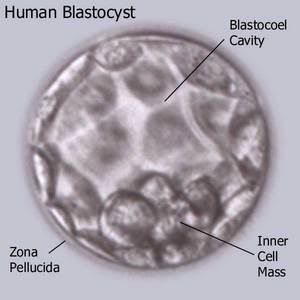 I'm absolutely positive most of us will never agree on neither the ethics nor morality of embryonic stem cell research. Therefore, I'm going to take the low road and base my argument on pragmatic grounds.
I'm absolutely positive most of us will never agree on neither the ethics nor morality of embryonic stem cell research. Therefore, I'm going to take the low road and base my argument on pragmatic grounds.As we've all no doubt heard by now, the House has
passed a bill to expand federal support of embryonic stem cell research. Bush's veto notwithstanding, a
Senate vote is likely imminent.
The vote came in the wake of news that South Koreans had
succesfully extracted stem cells from a cloned human embryo, an effort to advance therapeutic cloning. Obviously, one word springs to the public's mind: cures. And why shouldn't it? After all, the word is associated with EVERY headline and
editorial they see regarding embryonic stem cells. Pavlov's dog and all that stuff. Still, with promise after promise from both scientists and politicians that we are on the verge of discovering what would amount to the proverbial fountain of youth, I remain ever skeptical. Just how much do those ESCs have to offer us?
First of all, it must be noted that NO, I repeat, NO major medical breakthroughs or human benefits have occurred as a result of ESC research. That said,
this article sets to lay out the top four reasons why cures of any sort from therapeutic cloning (the culmination of ESC research)are decades away, if ever. I highly recommend that you read it. The author ignores the obvious problems facing TC, namely teratoma formation and genetic instability, and focuses on less intuitive issues. I'm going to summarize them here, and intersperse them with a few original ideas.
Reason number one is an
economic one. Part of the hype of the South Korean breakthrough is that the scientists were able to use the somatic cell nuclear transfer method, enabling them to produce stem cells that are identical gentic matches to those of the donors. This could
possibly allow for a rejection-free stem treatment. Okay, all well and good, except it took an average of 17 tries - that's 17 eggs - to establish each stem cell line. That's far greater efficiency than previous attempts, but those kind of numbers don't exactly put treatment on the drugshelf. That's at MINIMUM two IVF cycles necessary to produce just the raw material for a single patient. That
in vitro business
sure ain't cheap, and neither is what the Doc has to do each attempt he makes at cloning your little cell. Don't expect your insurance to cover it.
Reason number two:
egg donation is dangerous. Potential donors must be warned about that, especially at this stage in the research. Who is likely to donate? Young women needing to make an extra buck and family members of those who might one day benefit from TC. The family members are an extremely vulnerable group, and should be adequately informed of the risks they are taking in becoming a donor, especially in light of the fact that any donation they make will only go to research at this stage - not treatment. Two American bioethicists who reviewed the work of the South Koreans commented that, in their opinion, a good doctor would actually advise women against exposing themselves to the risk of egg donation. It's tough to do research when it relies on people putting their lives on the line.
A third reason that cures are a ways off is that the
safety and efficacy of TC has yet to be seriously researched and invested in. The author quotes
British stem cell scientists who point out that "the premature use of cell therapy could put many patients at risk of viral or prion diseases unless systems are in place." Potentially, a single stem cell line could be used for hundreds to thousands of patients, amplifying possible risk of disease transmission from a single infected donor. Memories of
HIV transmissions to people with hemophilia and
Hepatitis C infection via blood transfusions should make us wary of jumping right into a method of treatment that lacks sufficient contingencies. Again, more things to research, more money, more time.
The final problem is
the "specter of human reproductive cloning - to which nearly all voters are opposed." For anything to happen, Congress still has to pass a law to even allow therapeutic cloning...
a tough feat, but not impossible. Still, the bottom line is that the only difference between TC and full-blown, all-out human cloning is whether or not the development of the embryo is interrupted - a small, small step indeed at that stage of the game. Of course, any scientist worth his his spit knows this, but cloning is such a hot-bed issue that those who are in favor of TC keep their jolly little mouths shut about it (hence the widespread use of the term "somatic cell nuclear transfer" rather than the synonymous "cloning"). I HAVE to believe that cloning is the real reason that scientists and politicians are pushing TC so hard. After all, it's not like science hasn't established that
adult stem cell research has been
extremely productive. The myths promulgated about the inadequacies of ASCs have been dispelled
time and
again, and they have proven effective in
curing diabetes,
treating liver disease, even
curing blindness and
hearing impairments, and have REAL promise for much much more. Of course, lots of research still needs to be done. So why choose to invest in ESCs over adult stem cells? C-c-c-c-cloning. That's it. That's the conspiracy, the hidden agenda. Those who hope that cloning can and will be done have the perfect trojan horse with which to sneak it in, and you can bet they won't let out their little secret until it's come to fruition, quite literally.
I'm not really excited at all about the idea of little freak clones running around getting experimented on to holy hell, but it's the inevitable end of the current line of research. Granted, it's going to happen eventually, but the least we can do is keep our tax dollars from funding it. If the "experts" are so convinced that therapeutic cloning is the wave of the future, I'm sure it shouldn't be too hard for them to convince giants like Pfizer to allocate some of their
$8 billion dollar a year research fund toward it. Hell, I'd be willing to bet that they're already fitting at least part of the bill. Soooooo,
write your Senators. For real. I'm not just saying that. Tell them to treat ESC research like the money pit that it is, and vote against federal funding for it. Tell them that if they feel the impulse to fund any sort of stem cell research to make sure it's the already proven and established adult variety. That is all.
On a completely unrelated note, this is really funny:
premature evacuation




















